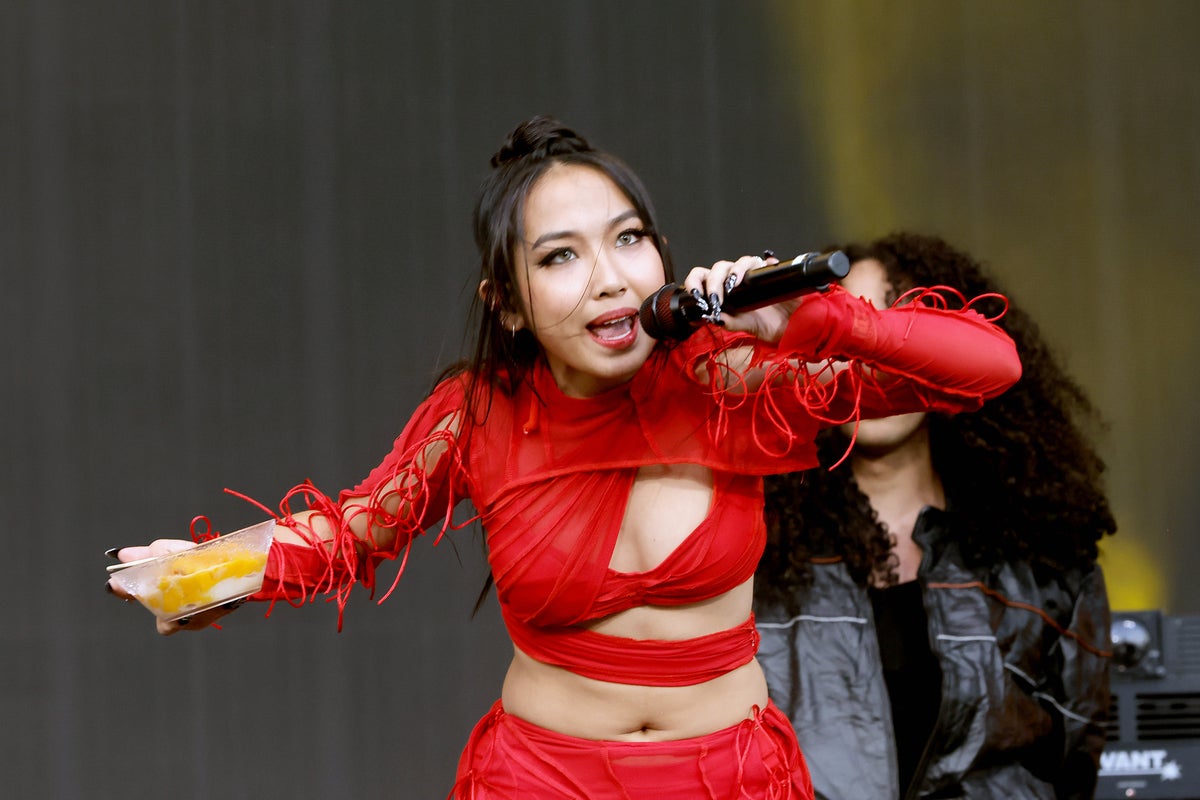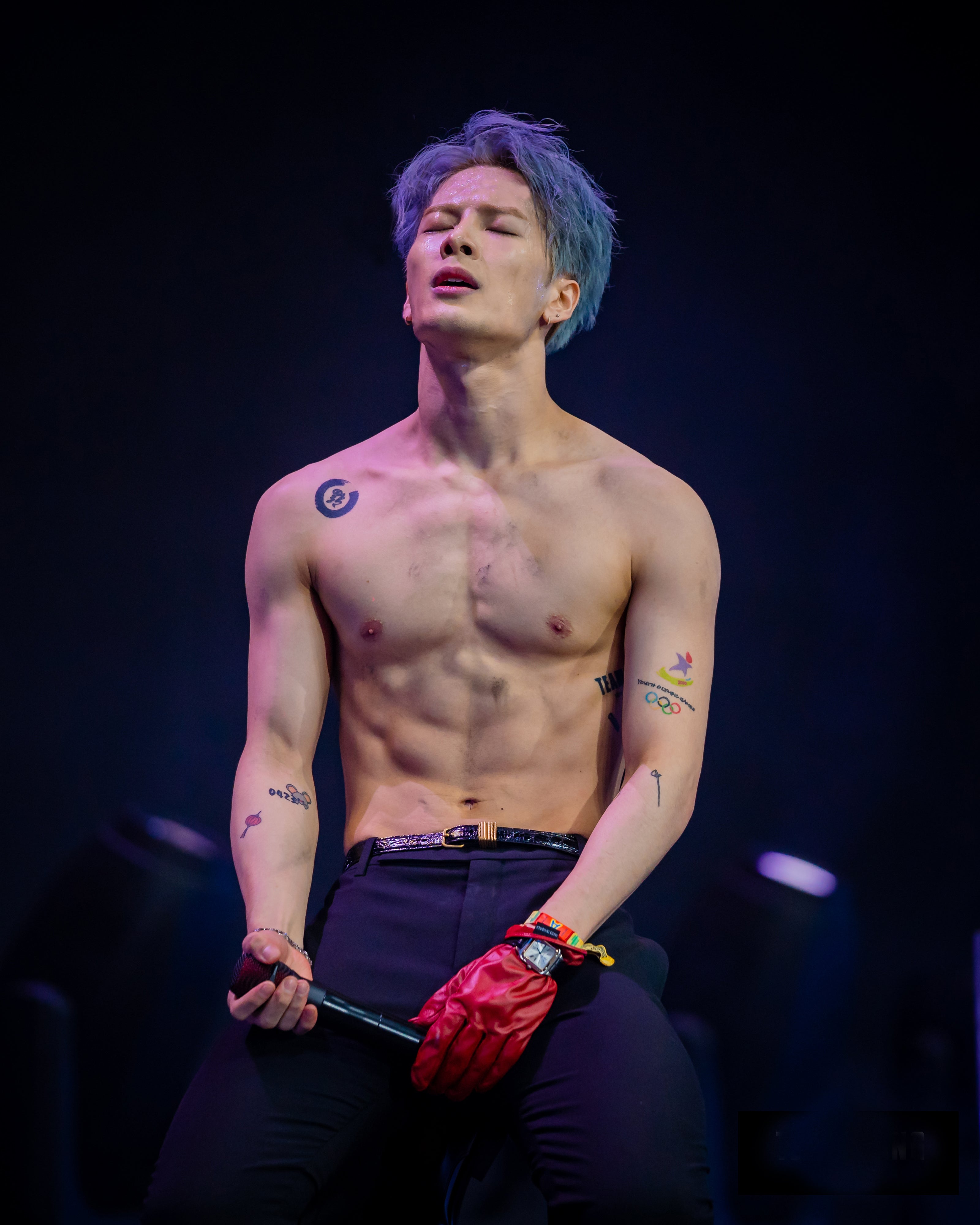
The biggest Chinese pop star in the world has just been ushered into a trailer on Universal’s backstage lot. Nervous-looking assistants surround him, but Jackson Wang – who wears his movie star looks as casually as he does a pair of flashy leopard print trousers – comes over for a bear hug. He’s in Los Angeles alongside a who’s who of superstars from across Asia at the final rehearsals for a gig like no other. Alongside South Korean rapper CL, Indonesian alternative hip-hop artist Warren Hue and Jakarta-born singer-songwriter Niki, Wang is here to prepare for 88rising’s historic main stage takeover at Coachella.
They’re the first record label in the Californian festival’s 23-year history to be afforded such an honour. Which isn’t bad going for a collective that was founded in 2015, and only started properly working with musicians in 2017. Since then, 88rising has managed to build a spectacularly successful sonic bridge between East and West, putting global eyes – and ears – on their young, effervescent sound; from Hue’s bouncy, house-y beats to Bibi’s party-starting pop and Rich Brian’s sophisticated SoundCloud bops. The Coachella show is an unmitigated triumph. Not only is the sprawling teenage crowd in raptures, but the festival livestream provides a raft of viral moments during the 90-minute set. The internet threatens to break during the surprise reunion of K-pop girl band 2NE1, and when rapper Milli eats a bowl of mango sticky rice onstage, retailers in Thailand report tripled sales of the traditional dessert. Biggest of all is Wang’s unannounced appearance, which becomes Twitter’s top global trending topic on the evening of the show. As his slickly choreographed moves slink along to the downright sexy and Weeknd-worthy likes of ultra-polished recent single “Blow”, it’s clear that Jackson Wang is the highlight for a host of fans here.
When we meet Wang before the festival, he explains why 88rising is so important. “The East and the West, we know each other, but at the same time there are many layers underneath that we don’t know,” he says. At 28, Wang is one of the older members of the 88rising artist stable. He’s been in the pop game for almost a decade, joining South Korean boyband Got7 after taking part in the 2010 Youth Olympics, fencing for Hong Kong. His team are keen for me to not ask any questions about the future of Got7; Wang is eager to discuss his forthcoming album, Magic Man. “The album is about the journey and the process of me finding my new self and dropping whoever I was and whatever I did in the past. Just putting it aside and starting anew,” he explains, a nod to his work pre-88rising, as part of the K-pop machine. “It’s the ultimate form of me after being through too much.”

The stresses of the endless industry grind, he says, ate away at him. “It got to the point where everything is like a loop. One thing after another. Schedules, schedules,” Wang sighs. “I was in this space where I didn’t know who I was any more. I felt like I was lost, I didn’t have motivation. I had nothing. I was going through a very hard time.”
It isn’t just a second solo album that’s helped Wang – who with 28.9 million fans is the most followed Chinese person on Instagram – achieve some kind of peace, but his work with this groundbreaking collective.
Started in New York by self-confessed music geek Sean Miyashiro, 88rising took its name from the lucky number of 88 and is also a reference to the Seoul Olympics of 1988, which Miyashiro remembers watching as a kid. Today Miyashiro – who is of Japanese and Korean descent – is in a leather cap and patterned shirt, bustling about the cavernous soundstage, coordinating a full laser and light show, as well as getting stuck in with a crew of dancers. At any one time there are at least 100 people in the huge room; CL sashays around in a silk robe, followed by her own camera crew; Rich Brian, Indonesia’s biggest rapper and one of 88rising’s first ever signings, grins impishly, while crew members gaze intently at Japanese songwriter Hikaru Utada serenading them through their video screens. At 41, Miyashiro might be a generation older than everyone else here, but he bounces perkily alongside them with just as much energy. An out-of-touch music exec he is not.

As a teenager in San Jose, California, Miyashiro started putting on everything from hardcore punk shows to b-boy battles. Then, at 21, he took over as booker of a local nightclub. “It was really broad sh*t,” he explains, with one of many grins. “I just enjoy people coming together.” Later, he worked at youth-facing media company VICE, founding their electronic music platform, Thump. The idea for 88rising came to him during one of many regular work trips to LA. “I’d meet up with my homies that were all Asian American, and I’d look at everybody and I was like, ‘Dude, everybody’s so talented! What if I just did stuff with them?’” So he did just that. Starting out with a YouTube channel and a clutch of graphic designers, the idea was to “make video content with cool people”. It was an instant success. Their first ever music video was for Brooklyn rapper Desiigner’s hit single “Panda”, which was nominated for Best Hip Hop Video at the 2016 MTV Video Music Awards. “We popped off super fast,” admits Miyashiro, with another smile. In 2017 they began signing their own talent, aiming to amplify and champion the work of Asian artists within hip-hop.
Now they have a roster of more than 40 artists from across a spectrum of genres, and co-founder of Interscope Records, Jimmy Iovine, is Miyashiro’s mentor. There’s more than music in 88rising’s future, too. The ambitious Miyashiro has spoken previously about plans for the company to be like “Disney for Asians”, and it’s a goal that’s looking more and more attainable. “I will say this, we are making some movies,” he says when I ask about reports that Sony Pictures asked 88rising to develop a television series. First up is Jamojaya, which stars Rich Brian in his film debut and is directed by Justin Chon, who was behind last year’s New Orleans-set Blue Bayou, in which he cast himself opposite Alicia Vikander. Miyashiro mentions “another thing” in development with a major streamer. “This could be the Asian West Side Story, man!” he says excitedly of 88rising’s second film, which is currently in development. “Nothing else like it exists already. If we make what is intended, it’s going to be a brand new thing.”
88rising’s success chimes with the current celebration of Asian culture in mainstream media. The biggest grossing Marvel movie in 2021 was Shang-Chi and the Legend of the Ten Rings – which features a host of 88rising artists on its soundtrack – while cult production house A24’s highest ever grossing movie at the US box office was the mind-bending multiverse martial arts adventure Everything Everywhere All at Once. Yet this success has also played out against a rise of anti-Asian hate crime in the US, which increased by 339 per cent last year from 2020.
Miyashiro is aware of the responsibility which goes alongside heading up the collective during a time of such violence. “This sh*t is so important,” Miyashiro states, keen for 88rising’s work to segue into activism. Last spring, they held a virtual concert for the Asian Mental Health Collective, a group of therapists who offer targeted help to members of the Asian community. “Being an Asian American is actually a pretty new thing,” explains Miyashiro of the hefty cultural significance attached to being Asian in the US. “There’s not tonnes of generations. Our parents are the first and many of them weren’t born here for the most part.” It’s this growing section of society that 88rising resonates with, offering much-needed mainstream representation. As movements go, it’s the very definition of trailblazing.
Indonesian singer-songwriter Niki was on the bill for the Asian Mental Health Collective and she’s also part of the bumper 88rising Coachella bill. She got her big break at just 15, opening for Taylor Swift in Jakarta, and is now based in Los Angeles, with her second album Nicole set for release on 12 August. To Niki, now 23, visibility is important. At 88rising’s very own Head in the Clouds festival in LA in 2019 she made an earnest dedication from the stage. “As an Asian female, I do not take this day and this stage for granted,” she pledged to the young crowd. “My hope is that above everything else today, that you feel heard, you feel understood, but most of all that you feel represented.” When I meet her, she’s proud to be something of a role model for her younger fans. “I feel like I’m bearing the weight of the world on my shoulders,” she says of her appearance at Coachella. “It’s like, ‘You’re the first Indonesian to do this’ – so there’s a lot of pressure but also a lot of excitement.”

I also meet Seoul-based R&B artist Bibi, who is perhaps one of the most boundary-breaking artists 88rising works with, thanks to a line of controversial merch that she currently has in the works. In her dressing room she casually tells me about her plans for a range of sex toys. “It’s really important, especially because Asians and Asian Americans don’t really speak about that kind of thing,” chimes one of her friends and translators. “Enjoy yourself!” beams Bibi. “Some people have said, ‘Oh my god, you’re crazy’ and other people have said, ‘I’m gonna use it first!’”
Since its inception, 88rising hasn’t just been about building a community, but doing things differently. From Bibi’s unconventional merch to rapper Rich Brian’s big-screen debut for the company, there’s always something unexpected in store. “This right here is magical,” says Miyashiro. It’s hard to argue with him.







